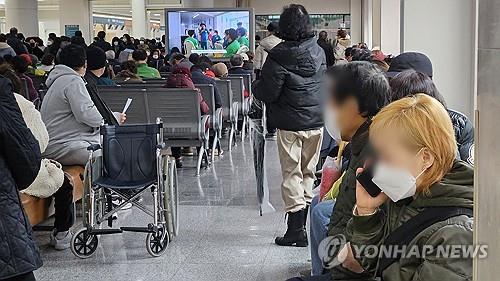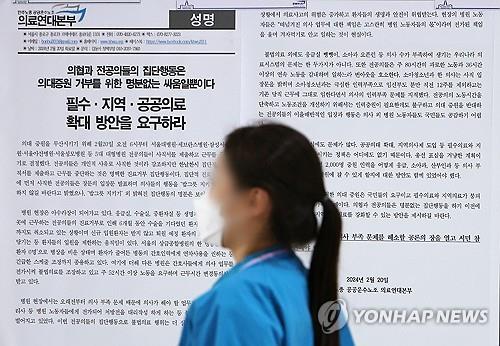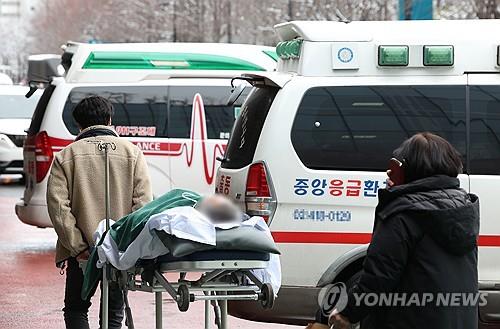- California Assembly OKs highest minimum wage in nation
- S. Korea unveils first graphic cigarette warnings
- US joins with South Korea, Japan in bid to deter North Korea
- LPGA golfer Chun In-gee finally back in action
- S. Korea won’t be top seed in final World Cup qualification round
- US men’s soccer misses 2nd straight Olympics
- US back on track in qualifying with 4-0 win over Guatemala
- High-intensity workout injuries spawn cottage industry
- CDC expands range of Zika mosquitoes into parts of Northeast
- Who knew? ‘The Walking Dead’ is helping families connect
Nearly 80 pct of junior doctors join walkout; top health service alert issued
Nearly 80 percent of trainee doctors nationwide have submitted resignations and over 7,800 doctors walked off the job to protest a plan to raise the medical school enrollment quota, leading to the government’s issuance of the highest health alert amid an exacerbating medical system crisis.
Intern and resident doctors in major general hospitals nationwide have taken collective action for a fourth day as they oppose the government’s plan to admit 2,000 more students to medical schools next year from the current 3,058 seats to address a shortage of doctors.
As of Thursday night, 8,897 trainee doctors from 94 major hospitals in Seoul and elsewhere, or 78.5 percent of their junior doctors, have submitted their resignations, and 7,863 of them have not turned up to work, according to the health ministry.
The latest figure marked a slight fall from the previous day’s reading, but that does not mean that doctors have returned to work as the government was forced to exclude six hospitals from the tally due to insufficient data, it added.
South Korea has around 13,000 trainee doctors across the country, and their role is crucial in emergency and acute health care duties.

The government received an additional 40 complaints from patients and others about the postponement of surgeries and other issues regarding the ongoing walkout, bringing the total such reports to 189.
A total of 11,481 medical students, or 61.1 percent of all medical school students of the country, have filed for a leave of absence as of Thursday against the quota hike plan, according to the ministry.
“Concerns have risen over the impact of the doctors’ collective action on the health and lives of the people, and the government raised the state health crisis warning from ‘alert’ to the highest ‘serious’ level,” Second Vice Health Minister Park Min-soo told a press briefing.
“Telemedicine services will be fully allowed starting today until doctors end collective action,” he added.
Telemedicine services had been partially available since 2020 in the wake of the COVID-19 pandemic. Only larger-scale hospitals were entitled to provide such services for non-first-time patients, though some exceptions are allowed for people in remote areas, as well as cases that take place at night and on holidays.

Under the top-level alert mode, the government vowed to mobilize all ministries concerned and resources available.
It will maximize the use of public medical institutions by extending their operating hours on weekdays to the maximum and expanding weekend and holiday services.
Four additional situation rooms responsible for transporting severely ill emergency patients will be established by early next month.
The government also vowed to provide financial support to hospitals for hiring more temporary workers.
It was the first time that the government activated such top-level protocols due to a medical service issue.
The Seoul municipal government and other provincial governments established a disaster safety management team of their own for responses.

Fears of a worsening crisis have grown as there appears to be no imminent breakthrough in sight, as doctors have vowed not to back down though the government has taken a firm stance against striking doctors.
The government has warned that those leading collective action could face arrest and medical licenses of doctors involved in a strike could be canceled.
“Things will be a total mess if the ongoing situation prolongs for another week,” a general hospital official said.
The Korean Medical Association, a major lobby group for doctors, is planning to hold large-scale rallies in Seoul on Sunday.








![trump[reuters]](http://www.koreatimesus.com/wp-content/uploads/2024/05/2023-06-10T235115Z_520439966_RC2NG1AXVQJW_RTRMADP_3_USA-TRUMP-copy-120x134.jpg)


